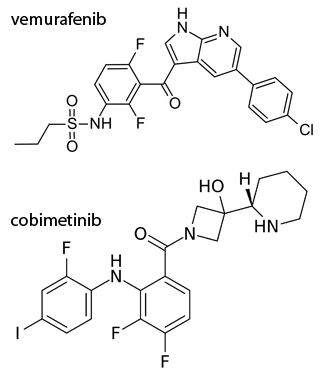Updated Data on Targeted Therapy Combination Confirm Benefit in Melanoma
Updated results from the coBRIM trial show that a BRAF/MEK inhibitor combination continues to provide clinical benefit in BRAF-positive metastatic melanoma.
Chemical structures of vemurafenib (top) and cobimetinib (bottom)

The combination of the BRAF inhibitor vemurafenib and the investigational MEK inhibitor cobimetinib continues to provide clinical benefit for untreated patients with BRAF-mutated metastatic melanoma, according to updated results of the phase III coBRIM trial (abstract 9006) presented at the 2015 American Society of Clinical Oncology (ASCO) Annual Meeting, held May 29 to June 2, in Chicago.
After a median follow-up of 14 months, the median progression-free survival (PFS) was 12.3 months for patients treated with vemurafenib and cobimetinib compared with 7.2 months in those treated with vemurafenib monotherapy (hazard ratio [HR] = 0.58; 95% CI, 0.45–0.72). Earlier results of the coBRIM trial, with a median of 7 months of follow-up, were published in the New England Journal of Medicine.
The overall response rate (ORR) in the combination arm was 70% compared with 50% in the control arm. Complete responses were seen in 16% and 11% of the combination and monotherapy treatment arms, respectively. Earlier results of the coBRIM trial showed a 10% complete response rate for the combination treatment.
The most frequent adverse events in patients treated with both vemurafenib and cobimetinib were diarrhea, rash, nausea, fever, sun sensitivity, liver lab abnormalities, elevated creatine phosphokinase, and vomiting.
Patients’ BRAF V600 mutation status and that of 528 known activating mutations in 17 oncogenic genes were analyzed using next-generation sequencing. Whether co-mutation status along with a BRAF mutation correlated with PFS or ORR was evaluated. A total of 46 of 423 patients (11%) had tumors with a BRAF V600 mutation plus an activating HRAS, KRAS, or NRAS mutation, or other receptor tyrosine kinase mutation.
“From the results presented today, patients whose tumors had both a BRAF mutation and a RAS, RAF, or receptor tyrosine kinase mutation did not have worse PFS or ORR than patients without a coexisting mutation,” said Omid Hamid, MD, director of melanoma therapeutics at the Angeles Clinic and Research Institute in California, who was not involved with the current study.
This is the second combination in development for BRAF-mutation positive melanoma. The combination of the BRAF inhibitor dabrafenib and the MEK inhibitor trametinib is already approved by the US Food and Drug Administration (FDA).
Vemurafenib is already approved by the FDA as a single-agent therapy for BRAF-positive disease. In December 2014, Roche and Exelixis filed for approval of the vemurafenib and cobimetinib combination based on the results of the coBRIM trial. A decision is expected in August of this year.
In an attempt to improve both the response rate and duration of response, researchers are now adding a third drug to the BRAF/MEK inhibitor combination. A phase I/II trial funded by the National Cancer Institute is now testing the dabrafenib and trametinib combination plus the AKT inhibitor GSK2141795 in solid tumors, including melanoma.